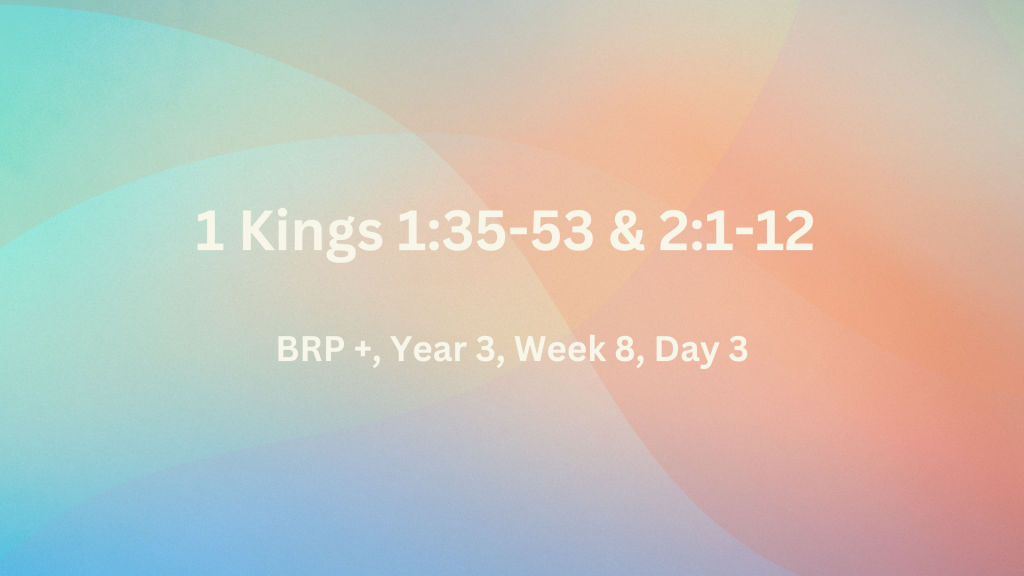1 Kings 1:35-53 & 2:1-12
Q.1. What impact did the anointing of Solomon have on David and his son Adonijah? How did Solomon treat his brother? – (1 Kgs.1:35-53)
Solomon was anointed king over Israel and Judah and placed on King David’s mule. This event was accompanied by the fanfare of trumpets – All the people went up after him, and the people were playing on flutes and rejoicing with great joy, so that the earth shook at their noise (1 Kgs.1:40 c.f. 1 Kgs.1:33-34). Soon Adonijah and his guests were told – 43 … Our lord King David has made Solomon king … 46 Besides, Solomon has even taken his seat on the throne of the kingdom. 47 Moreover, the king’s servants came to bless our lord King David, saying, ‘May your God make the name of Solomon better than your name and his throne greater than your throne!’ And the king bowed himself on the bed. 48 The king has also said thus, ‘Blessed be the Lord, the God of Israel, who has granted one to sit on my throne today while my own eyes see it’ (1 Kgs.1:43, 46-48). The ‘friends’ of Adonijah abandoned him (1 Kgs.1:49). Adonijah fled from Solomon and took hold of the horns of the altar for protection (1 Kgs.1:50). Solomon then placed him under house arrest and promised him immunity, as long as he avoided causing offence to the kingdom. This was an appropriate way to treat the entitled Adonijah (1 Kgs.1:51-53). David, by contrast, was full of joy – Blessed be the Lord, the God of Israel, who has granted one to sit on my throne today while my own eyes see it (1Kgs.1:48).
Q .2. What wise advice did David give to the young Solomon? Can these promises still be claimed and apply today? – (1 Kgs.2:1-4)
The aged David knew what the source of his blessing had been. He sought to impart this to his son, by urging him – Keep the charge of the Lord your God, to walk in His ways, to keep His statutes, His commandments, His ordinances, and His testimonies, according to what is written in the Law of Moses, that you may succeed in all that you do and wherever you turn (1 Kgs.2:3). To walk in the ways of the Lord, is still the basis for success in our daily living. God had also promised David that his dynasty would not fail, as long as – ‘If your sons are careful of their way, to walk before Me in truth with all their heart and with all their soul, you shall not lack a man on the throne of Israel.’ (1 Kgs.2:4). This promise specifically applied to David.
Q.3. Why would David ask Solomon to exact righteous judgment on some notable men? – (1 Kgs.2:5-12)
David had shown wonderful leadership qualities throughout his reign. He was well aware of his own faults and did not use his power to execute personal vengeance. He could have reacted to the bloodthirstiness of his commander Joab. His restraint when cursed by Shimei from the tribe of Benjamin, was outstanding. He realized the foolishness of trying to build a united kingdom by misusing his power as the king. However, these men had committed crimes of murder and treason, for which they deserved to die (1 Kgs.2:5 & 8). David warned Solomon that these men meant trouble for the unity of the nation. Equally, David reminded Solomon about the kindness of Barzillai from Gilead (1 Kgs.2:7). All these men deserved to be appropriately rewarded in due time. David released his son to rule as he saw fit and without prejudice (1 Kgs.2:6 & 9). David lived out his three score years and ten and was buried in royal David’s city (1 Kgs.2:10-11 c.f. 2 Sam.5:4; Lk.2:11). Solomon’s – kingdom was firmly established (1 Kgs.2:12).

